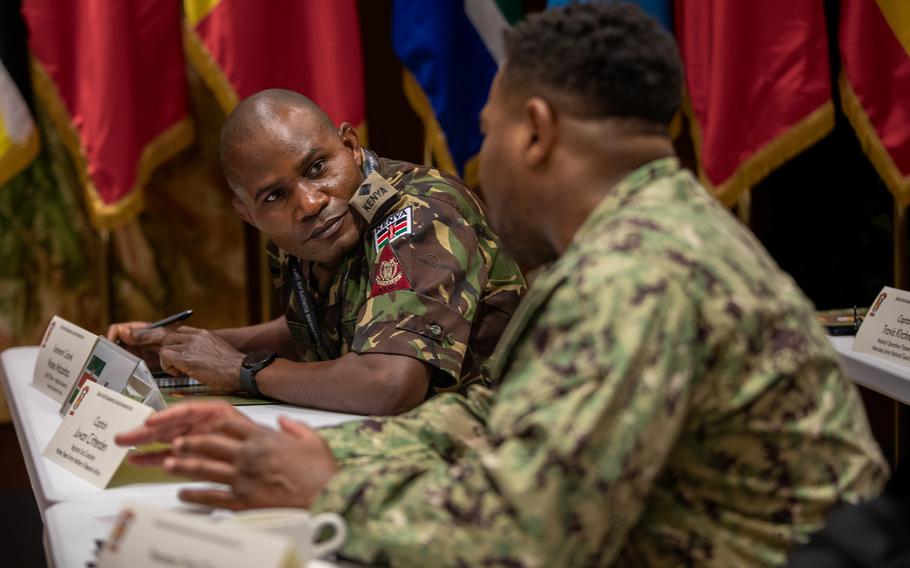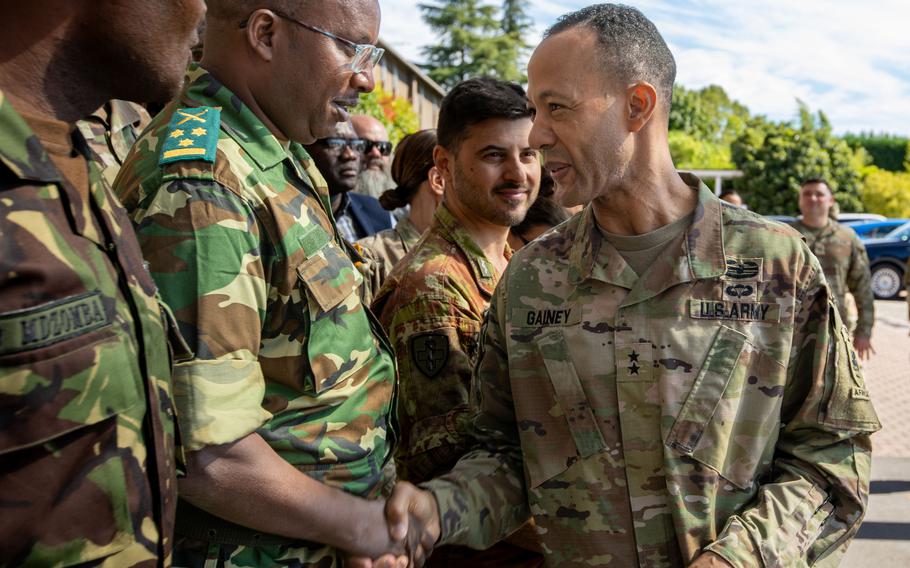
Kenyan army Lt. Col. Moses Mdzomba speaks with a U.S. Navy sailor Sept. 16, 2024, during a U.S. Army Southern European Task Force, Africa medical training planning session in Vicenza, Italy. (Katherine Sibilla/U.S. Army)
VICENZA, Italy — The U.S. aims to show that its prescription for good relations in Africa includes medical partnerships with militaries across the continent, some of which are engaged in heated campaigns against militant terrorist groups.
More than 100 people from 17 African countries visited Vicenza for a four-day annual planning event this week that included experts from U.S. Africa Command, U.S. Medical Command and U.S. Army Southern European Task Force, Africa.
As American adversaries Russia and China vie for influence in Africa, the U.S. is betting on partnerships, including in areas like medicine, to secure its position.
“We have never lived in a more volatile time,” Lt. Gen. Mary Izaguirre, surgeon general of the Army, told the audience. “Our place in bringing stability to that is critical, and the best way to do that is partnerships.”
Plans include various types of cooperation in the health care sphere, such as direct treatment. Another topic was medical readiness exercises, or MEDREX, which have cared for more than 47,000 patients in Africa since 2017.
“Medical readiness is a vital component of the U.S. strategy in Africa because it ensures both U.S. forces and our African partners are prepared to effectively respond to health emergencies, whether in combat or humanitarian situations,” said Col. Kelley Togiola, global health engagements chief for SETAF-AF.
Recent developments in Africa have complicated the situation there for the United States. Extremist violence is increasing in West Africa and American forces had to withdraw from former counterterrorism partner Niger after a coup last year.
Meanwhile, Russia and China are expanding their presence on the continent. Russian forces have now taken over the base formerly occupied by U.S. soldiers, and are working with Niger’s military junta.
Partnering with African countries on medical readiness is one way for the U.S. to create goodwill, military officials say.
At the same time, the U.S. learns about local customs and traditions and gets the chance to work on cases they wouldn’t otherwise see, like infectious diseases that have been eradicated in the U.S., said Chief Warrant Officer 3 David Kloberdanz, a food safety officer with the 30th Medical Brigade.
“We have colonels who have read about (a particular disease) in textbooks but have never seen it,” he said.
Each year during the planning event, African partners say what they will need. In the past, training and surgeries have been popular.
More recently, behavioral health has come up. Soldiers coming back from peacekeeping operations are grappling with post-traumatic stress disorder and other stress-related issues.
Partners said they appreciated that the trainings allow them to continue programs even after the U.S. leaves, and that the planning is African-led.
But stability across Africa can’t be left solely up to U.S. partnership, said Cmdr. James Aggrey-Orleans, a medical planner for Ghana’s armed forces.
“For the past three years we’ve been able to make it a point for the U.S. military to know that we believe in strengthening our ties with them but also with our partner nations,” he said. “We need stronger integration within Africa as we fuel stronger cooperation with the U.S.”

Maj. Gen. Andrew Gainey, commander of U.S. Army Southern European Task Force, Africa, greets participants at the SETAF-AF medical readiness event in Vicenza, Italy, on Sept. 16, 2024. (Katherine Sibilla/U.S. Army)